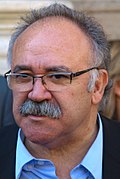1 November 2006 | |||||||||||||||||||||||||||||||||||||||||||||||||||||||||||||||||||||||||||||||||||||||||||||||||||||
All 135 seats in the Parliament of Catalonia 68 seats needed for a majority | |||||||||||||||||||||||||||||||||||||||||||||||||||||||||||||||||||||||||||||||||||||||||||||||||||||
|---|---|---|---|---|---|---|---|---|---|---|---|---|---|---|---|---|---|---|---|---|---|---|---|---|---|---|---|---|---|---|---|---|---|---|---|---|---|---|---|---|---|---|---|---|---|---|---|---|---|---|---|---|---|---|---|---|---|---|---|---|---|---|---|---|---|---|---|---|---|---|---|---|---|---|---|---|---|---|---|---|---|---|---|---|---|---|---|---|---|---|---|---|---|---|---|---|---|---|---|---|---|
| Opinion polls | |||||||||||||||||||||||||||||||||||||||||||||||||||||||||||||||||||||||||||||||||||||||||||||||||||||
| Registered | 5,321,274 | ||||||||||||||||||||||||||||||||||||||||||||||||||||||||||||||||||||||||||||||||||||||||||||||||||||
| Turnout | 2,982,108 (56.0%) | ||||||||||||||||||||||||||||||||||||||||||||||||||||||||||||||||||||||||||||||||||||||||||||||||||||
| |||||||||||||||||||||||||||||||||||||||||||||||||||||||||||||||||||||||||||||||||||||||||||||||||||||
| |||||||||||||||||||||||||||||||||||||||||||||||||||||||||||||||||||||||||||||||||||||||||||||||||||||
A regional election was held in Catalonia on Wednesday, 1 November 2006, to elect the 8th Parliament of the autonomous community. All 135 seats in the Parliament were up for election. Unlike other occasions, the election was held on a public holiday during the workweek, All Saints' Day. [1] [2]
Contents
- Overview
- Electoral system
- Election date
- Outgoing parliament
- Parties and candidates
- Opinion polls
- Graphical summary
- Voting intention estimates
- Voting preferences
- Victory preferences
- Victory likelihood
- Preferred President
- Predicted President
- Voter turnout
- Results
- Overall
- Distribution by constituency
- Aftermath
- Government formation
- Notes
- References
- Bibliography
The Socialists' Party of Catalonia (PSC), Republican Left of Catalonia (ERC) and Initiative for Catalonia Greens–United and Alternative Left (ICV–EUiA) had formed a coalition government in 2003 under Pasqual Maragall as Catalan president, in the first left-from-centre cabinet in Catalonia since the Spanish transition to democracy, colloquially dubbed as the "three-party" or "tripartite" alliance (Catalan : tripartito). Maragall oversaw the drafting of a new statute of autonomy for Catalonia, which aimed at further expanding the authority of the regional institutions, but negotiations between the national government of the Spanish Socialist Workers' Party (PSOE)—the PSC's sister party—and the Catalan nationalist Convergence and Union (CiU) and ERC were uneasy. ERC left the coalition in May 2006 over disagreements on the final statutory draft approved by the Spanish parliament, thus leaving Maragall in minority. Following the statute being ratified in a referendum on 18 June 2006, [3] [4] Maragall announced a snap election for 1 November and his decision not to run for a second term in office. [5] [6] [7]
The election saw the first undisputed win for Artur Mas's CiU since 1995, which in 1999 and 2003 had narrowly lost the popular vote to the PSC. However, the left-wing bloc formed by the latter—running under the former industry minister of Spain, José Montilla—together with ERC and ICV–EUiA, was able to secure a reduced but still working majority. The People's Party (PP) under Josep Piqué held its ground with a similar result as previous, but remained irrelevant in the government formation process. Citizens–Party of the Citizenry (C's), a new party formed under young lawyer Albert Rivera in opposition to Catalan nationalism and statutory reform, gained parliamentary representation by being able to clear the electoral threshold in the constituency of Barcelona.
















